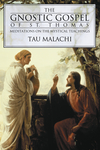A Gnostic Gospel & Oral Tradition

The Gospel of St. Thomas is perhaps among the most beautiful and powerful of the Gnostic Scriptures that appear in the Nag Hammadi library. Its great power lies in the fact that it is not encumbered by the literary device of a story-line, but is simply composed of sayings, many of which are left in a quite raw and primitive form, as though simply recording what was said in the power of the moment. Thus, the verses of the Gospel of St. Thomas are left open to a wide range of interpretation, and in doing this the author invites us to entertain an internal dialogue with the Spirit to gain our own insight and understanding of the Gospel. This quality, in and of itself, makes this Gospel specifically Gnostic, for at the heart of Gnostic Christianity is a spiritual or mystical experience of the Spirit of Truth akin to what the author invokes in the way the Gospel of St. Thomas is written.
As is common among Gnostic schools, it is very likely that originally there was an oral tradition of teachings associated with this Gospel, which is typical with all Scriptures used by Gnostics. Aside from the surface meaning, there are inner and secret levels of meaning that are drawn from the Scriptures, which form an oral tradition in a Gnostic school that is only spoken to initiates. Adopting the Gospel of St. Thomas as one of its primary Scriptures, the Sophian Tradition of Gnostic Christianity has developed an extensive body of oral teachings associated with the Gospel that point towards the deeper mystical and metaphysical implications of its sayings. The Gnostic Gospel of St. Thomas: Meditations on the Mystical Teachings basically provides a glimpse into this oral tradition that has evolved among Sophians.
There are several or more living traditions of Gnostic Christianity that predate the discovery of the Nag Hammadi library, Sophian Gnosticism being among these older Gnostic schools. Thus, the material that appears in The Gnostic Gospel of St. Thomas provides the reader with insight into the teachings of a living Gnostic tradition and into the deeper mystical implications Gnostics perceive in the Gospel. Yet, the intention of the teachings given in the book is not to put any limit on the potential meaning of the sayings, but rather to point the reader towards the deeper mystical and magical dimensions that may be seen within these sayings; hence the intention is to inspire the reader towards a deeper exploration of the mysteries.
Study and contemplation, and spiritual conversation, are themselves considered a spiritual practice by many Gnostic Christians. This is true of the Sophian Tradition, in which an art of study and contemplation is taught, and in which the methods of spiritual discourse often lead initiates into mystical experiences of the truth being contemplated and discussed. Within the book, a method for spiritual contemplation is given to help the reader take his or her insights further and to invoke the inspiration of the Spirit and the Inner or Christ Self in the process of studying the book. Essentially, it is the same method used by Sophian initiates in their study and contemplation, and is much the same as the method used for the inspiration behind writing this book. Along with the method for spiritual contemplation, there is also a traditional meditation given so that the reader might attune him or herself to the Living Yeshua—the Indwelling Light-Presence within him or herself—and perhaps enter into a state of experience from which Gnostics gain their inspiration, including the author of the original Gospel itself. Much like the Gospel of St. Thomas, this book is meant to invite and inspire, and perhaps to plant some seeds of light.
In truth, when the material for The Gnostic Gospel of St. Thomas was being written, it was not my intention to write a book for publication. At the time I was leading a study of the Gospel of St. Thomas among initiates of Sophia Fellowship, and the material was generated as a series of letters via email to students involved in the exploration. It was a delightful and playful adventure of contemplation among spiritual friends, which later came to be put together as a book. My intention was to help my friends recall and draw out deeper mysteries from our conversations on the Gospel through their own process of spiritual contemplation, as well as to put something of our oral tradition into writing. As it turns out, a book was written and has now been published, and many others can participate in this adventure of contemplation that occurred among Gnostic friends. Little did I know back then that by the time this book would be published, a Gnostic revival would be underway and The Gnostic Gospel of St. Thomas might serve to contribute to it!

About Tau Malachi
Related Products

is subject to certain Terms and Conditions